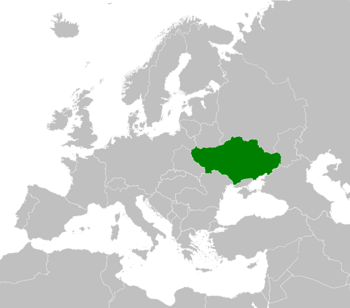Ukraine (TheodoresTomfooleries)
Imperial Territory of Ukraine
| |
|---|---|
| Regional anthem Za Ukrajinu "Farewell" | |
 Location of Ukraine (dark green) in Europe (dark gray) | |
| Capital and largest city | Kiroffo (Kyjiv) |
| Official languages | |
| Ethnic groups | |
| Religion | |
| Demonym(s) | Ukrainian |
| Government | Unitary semi-autonomous Reichsland of the Greater Germanic Reich |
• Reichsgouverneur | Lenz Schulz |
• Statthalter | Semen Bojko |
| Legislature | Landtag |
| Autonomous Reichsland of Germany (1970 - ) | |
• Established (as the Reichskommissariat Ukraine | 20 August 1941 |
• Civilian administration implemented | 1 September 1941 |
• Creation of the Reichsland Ukraine | 21 June 1970 |
| Currency | Reichsmark (ℛℳ) |
| Time zone | UTC+1 (CET) |
• Summer (DST) | UTC+2 (CEST) |
| Driving side | right |
| ISO 3166 code | UA |
Ukraine (Ukrainian: Ukrajina; German: Ukraine, officially the Imperial Territory of Ukraine, (Ukrainian: Imperśka Zemla Ukrajina; German: Reichsland Ukraine) is an autonomous, self-governing Reichsland of the Greater Germanic Reich. Formerly a German occupational authority as the Reichskommissariat Ukraine, the Reichsumstrukturierung established proper (albeit limited) civilian authority. As an autonomous Reichsland of Germany, the Ukraine has limited autonomy in its legislation, the right to appoint its Statthalter and its own legislature. In practice however, the Ukrainischer Landtag is nothing more than a rubber stamp for decisions made by the Reichstag in Germania.
While Ukrainian is an official language, in practice its usage is intentionally marginalised in favor of German, and the Ostdeutsch minority are given special status above the native Ukrainian population. Major cities with significant German colonial populations are segregated, with Ukrainians often receiving poorer commodities, housing, and education compared to their German counterparts. Ukraine's status as a highly important Breadbasket for the Greater Germanic Reich has resulted in its continued exploitation by Germania- even more so than its counterparts in White Ruthenia and the Baltics. Germania's forceful Germanization programs, along with its massacres and intentional starvation of the Ukrainian people (known as the Hunger Plan has resulted in the deaths of upwards of 10 million people, which has brought constant international condemnation due to Germania's refusal to acknowledge its crimes.
The United Nations does not recognize Germania's control over the Ukraine, nor does it recognize the Reichsland as the legitimate government of the Ukraine. Instead, the United Nations recognizes the Government of the Ukrainian People's Republic, an authority in exile since 1921, as the government of the Ukraine. This is disputed however, with many Ukrainian ultranationalists living abroad supporting the Ukrainian State as the legitimate government.


